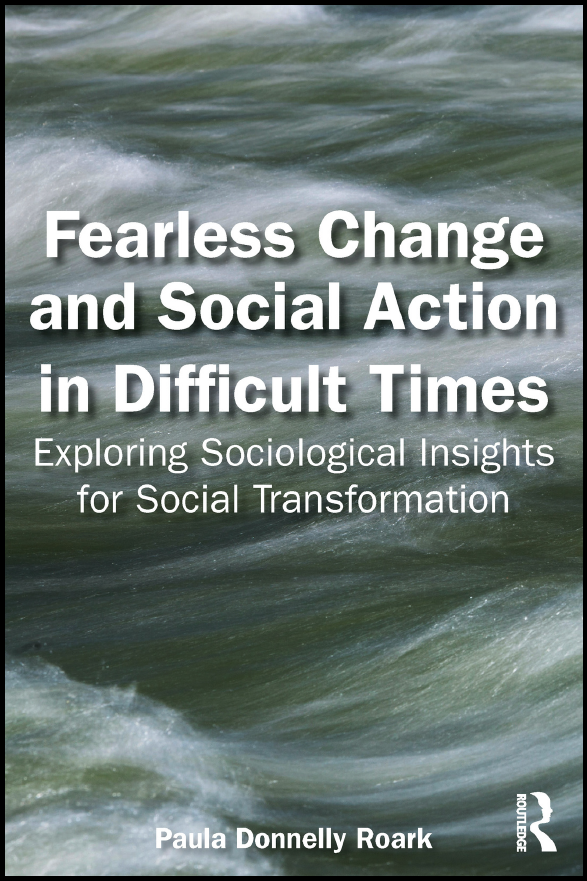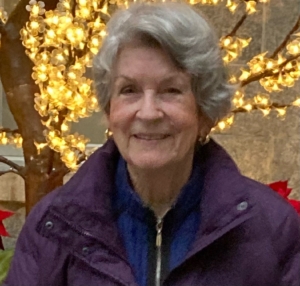NEW BOOK AND AUTHOR INFO
My New Book

We are often divided about how to move forward in this time of instability and change. But one thing is for sure. We have extraordinarily consequential decisions to make for the remaining years of this decade and the next. The critical question is: do we acquiesce and shrug our shoulders; fight each other to the bitter end; or do we fearlessly change and begin to flourish together? My new book, Fearless Change and Social Action in Difficult Times, is intended for those who choose to fearlessly change and flourish together.
The 2020 national election gave us breathing space, but it clearly did not wipe away the dangers of incipient authoritarianism and the ever-increasing violence which accompanies Mr. Trump’s 2025 ascendency to the US presidency. Nor can we find any foundation for effective negotiation or compromise with those political perspectives which in the past have demanded, and now implicitly assume, that some groups are to be considered ‘less than’, and are therefore expendable. As a result, political negotiation, accommodation, and compromise—the mainstays of political power—are no longer effective.
Instead, for true change, we need something more comprehensive, more profound; something like a culture-shift, even a collective change of consciousness. It is exactly here that Fearless Change situates itself illustrating how ‘social integrative power’ and ‘deep participation’—the heart of this book—operate together at that pivotal juncture between current politics and effective social action.
Most important, Fearless Change clarifies the critical shift between the social and the political/economic. This clarification makes all the difference because political and economic change can only take us so far. Political protests, with their demands for reform, absolutely have their place and we must continue them—we must hold the line for democracy. But deep participation dynamics, creating social power will take us further, both in terms of positive change and healing solidarity over the long term. In other words, understanding the difference between political and economic power to which we are accustomed, and social power of which we know little, takes us to the next level.
It does so because social power connects us. It enhances social relations which are the basis of trust, solidarity, love, social status, values, identity, ideas and community, all of which can establish true equality. It is only these factors, collected together as social power, which can confer acceptance and legitimacy on new ideas and institutions. This is how culture-shifts are created. To be clear, these are not partisan political shifts between Democrats and Republicans, but cultural-shifts based on shared principles of freedom and equality.
Also of importance, it is only by using the social dynamics of deep participation, which brings forth social power, that the profound changes we need for new legitimacies to emerge can be peacefully achieved. Deep participation itself is a little known but well researched dynamic participatory process. It brings new ideals and new ways of doing into the reality of the world.
It does so by expanding deep participation group by group, creating the collective trust and shared ‘self-knowledge’ of society that is necessary for true change. With these collective social actions, deep participation social movements are then able to collectively change our living injustice. In other words, ‘social power’ can change the present status quo. It is important to note here that while the current phenomena of polarized politics is exhausting to so many of us, social power and deep participation provides a shared collective social energy that has positive, happy, even joyful effects for all of us.
Fearless Change and Social Action in Difficult Times also provides the necessary information for group reflection and expanded cultural understanding to succeed in each of the necessary steps. It first digs deep into the four ancient wrongs to understand their root and inter-related causes. It then explores exit strategies that can begin to positively change the structure of our society and our communities. Understanding the social power/deep participation process as a social movement is also essential in organizing multiple groups for maximum impact.
Finally, with this solidarity-growing social power we can begin to recognize, and then explore those out-of-sight, out-of-mind collective thought-worlds which give legitimacy to the current implicit rules of society—those intangible ‘systems’ of thought of which we are now becoming aware. Using deep participation and social power, it is possible to reinvent those enduring thought-worlds which are negative—thereby changing those outdated and sometimes immoral implicit rules of society. It is here that socially based rapid culture shifts have their beginning.
Paula Donnelly Roark, January 20, 2025
Paula Donnelly Roark, PhD
Paula Donnelly Roark is a social science researcher, writer, and participation/scholar who combines theory and practice in social movements for social change. She has used these skills to focus on justice, poverty eradication, environmental sustainability, and conflict diminution. Paula began her career with a Fulbright professorship in Burkina Faso, West Africa. Donnelly Roark has served as a Senior Social Scientist at the World Bank, Director of Research and Evaluation at the African Development Foundation, and as an advisor to the United Nations’ UNICEF, UNDP, and British government aid. She is the author of Social Justice and Deep Participation: Theory and Practice for the 21st Century (2015).
It is difficult, however, to describe my career apart from my personal and social life. The two have always been inter-mixed, accentuating pursuit of new and different perspectives. It began in a rather dramatic way. I left the US for the first time after graduating from university to visit a friend working as a volunteer in the relatively new republic of Algeria. Getting there turned out to be more of an adventure than I had anticipated. As it turned out, I was on the first plane to enter the country after a military coup. I left the plane hand-in-hand with a new-found Algerian woman-friend who nonchalantly maneuvered us through a corridor of soldiers with their guns at-the-ready. That situation began a process that changed the direction of my life and work. The social and political tumult, the never-ending discussion of new ideas, the association and friendships with people of profoundly different cultures, living radically different life experiences—all began an intellectual and social process that changed my life.
That experience also further changed my career aspirations. I became enthralled instead with the enormity and intensity of the social, political, and economic change taking place all around. So, a change in career path began, with a focus on social change and culture. Several years later living in Burkina Faso with my husband and two small children as a Fulbright-Hayes professor at the University of Ouagadougou and the National Institute of Education, I was once again, extremely socially fortunate. Because of growing friendship, a group of Burkinabe colleagues, highly experienced in participation and community development, introduced me to their participatory processes from the inside out. They continued to mentor me on how it interacted with indigenous institutions, enabling change but conserving belonging and solidarity.
 This participatory and indigenous institutions perspective became central to my social change work and research. Over the years, I have worked in 22 different countries, always using and expanding this social integrative power orientation. Some of the work highlights include: for UNICEF in Somalia, I wrote the organization’s first “Situation Analysis of Women and Children; as a long-term consultant for UNDP, I undertook multiple assignments focusing on participatory and sustainable development, often for marginalized communities.
This participatory and indigenous institutions perspective became central to my social change work and research. Over the years, I have worked in 22 different countries, always using and expanding this social integrative power orientation. Some of the work highlights include: for UNICEF in Somalia, I wrote the organization’s first “Situation Analysis of Women and Children; as a long-term consultant for UNDP, I undertook multiple assignments focusing on participatory and sustainable development, often for marginalized communities.
Returning to the US and based in Washington, D.C., I was Director of Research and Evaluation for the African Development Foundation, a public corporation that funds local African communities directly and reports to the US Congress; I then was a Senior Social Analyst for the World Bank’s Environmental and Social Department where I was responsible for assisting local communities to establish equitable, participatory communication systems with their regional and national governments, and assisted national governments to formulate supportive policies.
The British economic development program (DFID) later talked me into a new and original assignment: working with a national Congolese team to initiate participatory poverty programming to diminish conflict in the Congo. It was a daunting but highly rewarding initiative. Later, I was asked to replicate a similar program in the Central African Republic, with an again highly skilled national team. Both of these assignments were quite different, and high risk in terms of success because they took place in the midst of conflict, and we were not at all sure that social power and participatory programs could work in the midst of violence. But they did: the national teams were extraordinary; and the contributions to peace while incomplete, were substantive.
In sum, all of these diverse assignments over the years had one thing in common—a focus on the social and its power to re-establish trust and legitimacy—not a concept initially accepted easily by many of my colleagues. Usually, social change with its shifts in values and social structures is so slow moving as to be almost imperceptible. But my multi-faceted African experience—professional, social and cultural—often with fast-moving changes due to instability and the threats of violence, allowed me to understand how the dynamics of social change for every society take place and change in the interface between the power of the social and the power of the political and economic.
I learned how social integrative power emerges so groups in diverse societies can ‘culturally re-image’ their collective social compacts and critical societal institutions. It is this indigenous dynamic of each society which provides social legitimacy and the societal ‘license to operate’ in times of change. I wrote about this in my first book as theory and practice observed in both the United States and Africa. This book, Social Justice and Deep Participation was published in 2015 by Palgrave Macmillan. At that point I thought I was through writing books—one and done.
Then in 2016, the new presidency of a toxic-leaning US leader, exposed, expanded, and took advantage of an already ongoing negative shift in values ongoing throughout the nation. As these changes speeded up, I realized that the same, almost imperceptible, critical interface between the social and political/economic —to which hardly anyone pays attention until it’s too late—was where these negative shifts were taking place.
As a result, I once again began researching and writing. After six years—much longer than I anticipated—Fearless Change and Social Action in Difficult Times is the result. Clarifying the shift between the political and the social makes all the difference. This is where true social, political, and economic change begins that can decimate all of the four ancient wrongs.